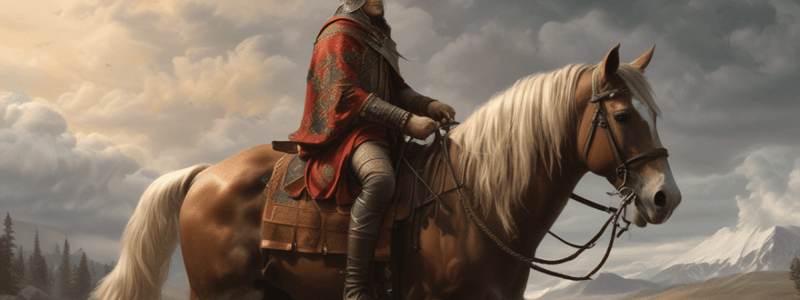Podcast
Questions and Answers
What is the approximate date range for the Prehistory era?
What is the approximate date range for the Prehistory era?
- c. 3.3 million BCE - 3500 BCE (correct)
- c. 1500 - 1800 CE
- c. 500 - 1500 CE
- c. 3500 BCE - 500 CE
Which historical period is characterized by the rise of Christianity and feudalism?
Which historical period is characterized by the rise of Christianity and feudalism?
- Iron Age
- Renaissance
- Early Modern History
- Middle Ages (correct)
What is the name of the pandemic that devastated Europe in the 14th century?
What is the name of the pandemic that devastated Europe in the 14th century?
- Crusades
- Black Death (correct)
- American Revolution
- Columbian Exchange
Who was the ancient Greek king and conqueror?
Who was the ancient Greek king and conqueror?
What is the name of the series of religious wars between Christians and Muslims?
What is the name of the series of religious wars between Christians and Muslims?
What is the name of the historical period marked by the emergence of reason and scientific inquiry?
What is the name of the historical period marked by the emergence of reason and scientific inquiry?
Flashcards are hidden until you start studying
Study Notes
Eras of History
- Prehistory: Before written records (c. 3.3 million BCE - 3500 BCE)
- Includes the development of early humans, agriculture, and civilizations
- Ancient History: Emergence of civilizations (c. 3500 BCE - 500 CE)
- Includes ancient Mesopotamia, Egypt, Greece, Rome, and China
- Medieval History: Middle Ages (c. 500 - 1500 CE)
- Characterized by the rise of Christianity, feudalism, and the Crusades
- Early Modern History: Renaissance to Enlightenment (c. 1500 - 1800 CE)
- Includes the Renaissance, Reformation, and the emergence of nation-states
- Modern History: Industrialization to present day (c. 1800 CE - present)
- Marked by industrialization, imperialism, world wars, and globalization
Historical Periods
- Stone Age: Early human development and tool use (c. 3.3 million BCE - 3000 BCE)
- Bronze Age: Development of metal tools and early civilizations (c. 3000 BCE - 1200 BCE)
- Iron Age: Widespread use of iron and development of complex societies (c. 1200 BCE - 500 CE)
- Middle Ages: Feudalism and the rise of Christianity (c. 500 - 1500 CE)
- Renaissance: Cultural and intellectual revival in Europe (c. 1300 - 1600 CE)
- Enlightenment: Emergence of reason and scientific inquiry (c. 1600 - 1800 CE)
- Industrial Revolution: Transformation of industry and society (c. 1700 - 1900 CE)
Historical Events
- Crusades: Series of religious wars between Christians and Muslims (1095 - 1291 CE)
- Black Death: Pandemic that devastated Europe (1346 - 1353 CE)
- Columbian Exchange: Transfer of plants, animals, and cultures between the Old and New Worlds (1492 CE)
- American and French Revolutions: Establishment of modern democracies (1775 - 1783 CE and 1789 - 1799 CE)
- World War I and II: Global conflicts that shaped the modern world (1914 - 1918 CE and 1939 - 1945 CE)
Historical Figures
- Alexander the Great: Ancient Greek king and conqueror (356 - 323 BCE)
- Julius Caesar: Roman general and statesman (100 - 44 BCE)
- Leonardo da Vinci: Renaissance artist and polymath (1452 - 1519 CE)
- Napoleon Bonaparte: French military leader and emperor (1769 - 1821 CE)
- Abraham Lincoln: American president and abolitionist (1809 - 1865 CE)
Studying That Suits You
Use AI to generate personalized quizzes and flashcards to suit your learning preferences.




